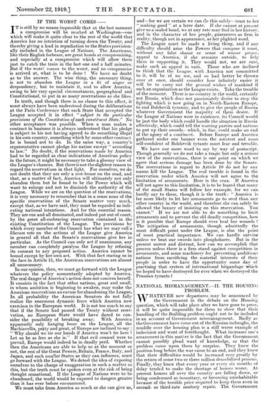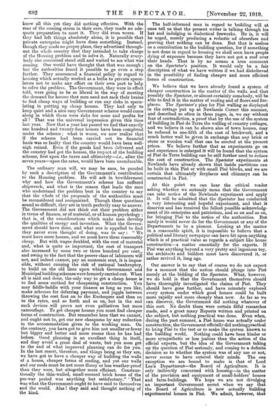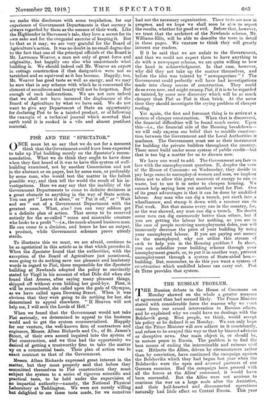NATIONAL MISMANAGEMENT.—II. THE HOUSING PROBLEM.
WHATEVER new departures may be announced by the Government in the debate on the Housing question, which will take place after we have gone to press, it will be quite impossible for them to show that their handling of the Building problem ought not to be included in an account of Government mismanagement. Badly as the Government have come out of the Russian imbroglio, the muddle over the housing plan is a still worse example of indecision and want of forethought. What increases one's amazement in this matter is the fact that the Government cannot possibly plead want of knowledge, or that the problem came upon them by surprise. They knew the position long before the war came to an end, and they knew that their difficulties would be increased very greatly by the return of some two or three million demobilized persons. Finally, they knew that every year or every six months of delay tended to make the shortage of houses worse. At present houses all over the country are falling down, or being condemned as insanitary, or becoming uninhabitable because of the terrible price required to keep them even in secondor third-rate sanitary repair. The Government knew all this yet they did nothing effective. With the roar of the coming storm in their ears, they made no adequate preparation to meet it. They did even worse. If they had left things absolutely alone, it is possible that private enterprise might have done something. Instead, though they made no proper plans, they advertised throughout the whole country that they intended to take charge of the Housing problem and to solve it. Naturally everybody else concerned stood still and waited to see what was coming. One would have thought that that was enough ; but the authorities found it possible to go even a step further. They announced a financial policy in regard to housing which actually worked as a bribe to private speculators not to make any effort on their own part to help to solve the problem. The Government, they were in effect told, were going to be so liberal in the way of meeting the demand for houses that men need not rack their brains to find cheap ways of building or run any risks in speculating in putting up cheap houses. They had only to keep quiet and a nice easy Government scheme would come along in which there were risks for none and profits for all ! That was the universal impression given this time last year. Now that a year has passed we find that exactly one hundred and twenty-four houses have been completed under the scheme ; what is worse, we now realize that if the scheme had been carried out its financial basis was so faulty that the country would have been wellnigh ruined. Even if the goods had been delivered and the country had got the houses, the impact of the building scheme, first upon the taxes and ultimately—i.e., after the seven years—upon the rates, would have been unendurable.
The ordinary man will, we may be sure, be puzzled by such a description of the Government's contribution to the Housing problem. He will ask in bewilderment why and how the Government's scheme has suffered shipwreck, and what is the reason that leads the men who understand the problem best in the country to say that the whole of the proposals of the authorities must be reconsidered and reorganized. Though these questions sound so difficult, they are in truth perfectly easy to answer. The Government did not think out their problem either in terms of finance, or of material, or of human psychology ; that is, of the considerations which make men develop the qualities of energy and invention. What the Government should have done, and what one is appalled to find they never even thought of doing, was to say : " We must have more houses, and we must have them reasonably cheap. But with wages doubled, with the cost of material and, what is quite as important, the cost of transport also increased by some two or three hundred per cent., and owing to the fact that the poorer class of labourers will not, and indeed cannot, pay an economic rent, it is impossible, without running the risk of national bankruptcy, to build on the old lines upon which Government and Municipal building schemes were formerly carried out. When all is said and done, the only way to get a cheap house is to find some method for cheapening construction. You may fiddle-faddle with your finance as long as you like, make schemes for deferring payment, and juggle between throwing the cost first on to the Exchequer and then on to the rates, and so forth and so on, but in the end such devices will prove not even palliatives but mere camouflage. To get cheaper houses you must find cheaper forms of construction. But remember here that we cannot, and ought not to, get our new cheapness by any reduction in the accommodation given to the working man. On the contrary, you have got to give him not smaller or fewer but bigger and better and more rooms than he has had before. Good planning is an excellent thing in itself, and may avoid a great deal of waste, but you soon get to the end of what improved planning can do for you. In the last resort, therefore, and things being as they are, we have got to have a cheaper way of building the walls of a house, cheaper forms of roofing, and yet our walls and our roofs must be not more flimsy or less weather-proof than they were, but altogether more efficient. Constructionally the thin-walled, small-roomed brick house of the pre-war period was anything but satisfactory." That was what the Government ought to have said to themselves and the world. Alas they said and thought nothing of the kind. The half-informed man in regard to building will at once tell us that the present writer is talking through his hat and indulging in dialectical fireworks. He is, it will be urged, merely producing a reductio ad absurdum and proving that nothing can be done. But that is useless as a contribution to the building question, for if something is not done in regard to housing we shall soon have people dying of exposure because they have not got a roof over their heads. That is by no means a true comment on the Spectator's position. It would only be a fair description of what we have written if we had disbelieved in the possibility of finding cheaper and more efficient forms of construction.
We believe that we have already found a system of cheaper construction in the matter of the walls, and that possibly the Spectator, or almost certainly somebody, will be able to find it in the matter of roofing and of floors and fireplaces. The Spectator's plan for Pise walling as displayed in the cottage put up at Newlands Corner this summer, and described so often in these pages, is, we say without fear of contradiction, a proof that by the use of the system of building in Pise de Terre the walling of country cottages, and we believe it can be shown also of town houses, may be reduced to one-fifth of the cost of brickwork, and a much better wall be given in exchange than any brick or stone or wooden wall that can be erected at the present prices. We believe further that as experiments go on and experience is enlarged it will be found that the system of Pise de Terre building can be still further used to reduce the cost of construction. The Spectator experiments at Newlands have already shown that inside partitions can be built in thin Pise or with small Pise blocks, and we are certain that ultimately fireplaces and chimneys can be constructed in Pis& At this point we can hear the critical reader asking whether we seriously mean that the Government can take notice of the Newlands experiment and apply it. It will be admitted that the Spectator has conducted a very interesting and hopeful experiment, and that it deserves and has received the fullest possible acknowledgment of its enterprise and patriotism, and so on and so on, for bringing Pise to the notice of the authorities. But surely it would never do for the Government or any of the Departments to be a pioneer. Looking at the matter in a reasonable spirit, it is impossible to believe that a political and literary newspaper can have hit upon anything which is of practical value as regards a subject like house construction—a matter essentially for the experts. If Pise was anything beyond a very pretty and ingenious toy, the architects and builders must have discovered it, or rather revived it, long ago.
Our answer is to say that of course we do not expect for a moment that the nation should plunge into Pig merely at the bidding of the Spectator. What, however, we do hold is that the Government themselves should have thoroughly investigated the claims of Pis& They should have gone further, and have minutely explored every system under which good houses could be built more rapidly and more cheaply than now. As far as we can discover, the Government did nothing whatever of this sort. No doubt there were certain fitful researches made, and a great many Reports written and printed on the subject, but nothing practical was done. Even when, during the past summer, a Pig house was actually under construction, the Government officially did nothing practical to bring Pise to the test or to make the system known to the building world. Nothing could have been kinder or more sympathetic or less jealous than the action of the official experts, but the idea of the Government taking up the question of Pig seriously, and coming to a definite decision as to whether the system was of any use or not, never seems to have entered their minds. The one exception we are bound to make is that of Lord Lee's Department—the Board of Agriculture. It is only indirectly concerned with housing—in the matter of the provision and equipment of small-holders' houses and farm-buildings. We hope we are not divulging an important Government secret when we say that the Board of Agriculture is now actually building experimental houses in Pise. We admit, however, that we make this disclosure with some trepidation, for our experience of Government Departments is that secrecy is always regarded by them as the essence of their work. Like the Highlander in Stevenson's tale, they love a secret for its own sake and for the congenial exercise of keeping it. But be that as it may, we are very grateful for the Board of Agriculture's action. It was no doubt in no small degree due to the fact that one of the principal officials of the Board is Mr. Lawrence Weaver, a man not only of great force and originality, but happily one also who understands what building is. We should indeed call Mr. Weaver an expert in cottage construction if that designation were not so tarnished and so equivocal as it has become. Happily, too, Mr. Weaver has good taste as well as energy, and we may be sure that in any scheme with which he is concerned the element of seemliness and beauty will not be forgotten. But enough of such indiscretions. We are not sure indeed that we shall not have incurred the displeasure of the Board of Agriculture by what we have said. We do not want to give any Department of State an opportunity for declaring Pith to be a tainted product, or of following the example of a technical journal which asserted that earth until it is cooked is a vile and almost pestilent material.








































 Previous page
Previous page